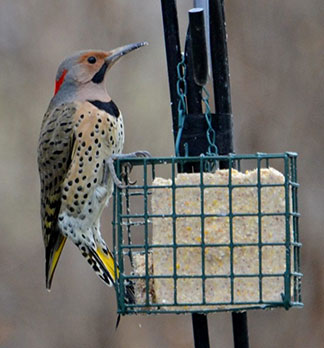 |
Previous Issues |
| Cedar Mill Community Website |
|
Search the Cedar Mill News: Search the Cedar Mill News
|
About The Cedar Mill News |
|
|||||||
| Volume 16, Issue 11 | November 2018 |
||||||
Feed the birds!
|
|||
 |
Do you like to feed the birds in your garden? Many of us put out bird feeders to help our feathered friends during the winter months. According to the experts, bird feeders are most helpful when the weather is bad. Although birds are resourceful at finding food even in winter, severe weather will make that difficult, and our feeders can be lifesavers. If you usually put birdseed out in winter the birds remember and will visit your feeder.
It’s important to clean feeders regularly, discarding any wet or moldy seed. Dry well before refilling. This is important for protecting birds from mold and fungus. Covered feeders help to keep seed dry.
Place the feeder closer to the house where it is sheltered from wind and where you can observe the birds. Seed with no hulls are a great choice for deck feeders as they make zero waste. Different seeds attract different birds.
Suet is another food birds need in winter when insects are not available. In the fall it allows migratory birds to store fat for their journey. Purchasing suet cakes with berries, seeds and insects is an easy way to feed the birds, and attracts flickers and other woodpeckers that don’t usually go to feeders.
The Audubon Society on Cornell Rd. has a great selection for many types of birds. They have wonderful books also for identifying them. The more we learn about birds the more we will enjoy them.
Only some birds are attracted to feeders. If you are interested in seeing a bigger variety of birds, planting shrubs and trees that produce berries that birds relish will attract a bigger variety of them to your garden. Dogwood (Cornus florida), Crabapple with small fruit, wild grape vine, Virginia creeper, Northern bayberry, Staghorn sumac, red-osier dogwood, gray dogwood, Nannyberry, (Viburnum), Winterberry holly are some good choices. For berries you must plant a male and a female shrub of winterberry.Your local nursery can recommend others.
Birds are so important to the web of life we should learn as much as we can about them. They help control harmful insects in our gardens; their songs bring us joy. Let’s do everything we can to protect them!
Questions? Email me at margierose2@gmail.com or call 503-645-2994.
![]()
Like us on Facebook for timely updates
Published monthly by Pioneer Marketing & Design
Publisher/Editor:Virginia Bruce
info@cedarmillnews.com
PO Box 91061
Portland, Oregon 97291
© 2013